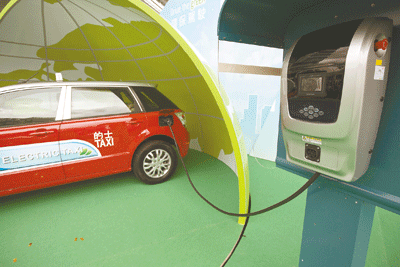|
CHINA’S auto sales could be heading for a rare fall this year, but one bright spot is in so-called green cars, where sales have almost quadrupled so far in 2015.
With a part-carrot, part-stick strategy of incentives and targets, the Central Government is pushing carmakers to develop battery electric cars, seeing this as its best shot at closing a competitive gap with global rivals who have a 100-year headstart in traditional combustion engines.
With an eye on both big subsidies and looming fuel economy targets, automakers in China are earmarking at least 50 billion yuan (US$7.86 billion) this year for developing and making “new energy” vehicles, a Chinese catch-all term for electric and highly electrified cars, data compiled by Reuters shows.
“Some time ago, President Xi Jinping explained it very well, saying that developing new energy vehicles is the Chinese auto industry’s only road to grow from being big to being strong,” Xu Heyi, chairman of Beijing Automotive Group, told reporters recently.
Electric and plug-in hybrid car sales jumped 270 percent to 108,654 cars in January-August, the China Association of Automobile Manufacturers (CAAM) said Thursday, and China is on track to overtake the United States as the world’s leading producer, making more than 130,000 such cars this year, according to consultancy LMC Automotive.

The government has set a goal of annual production of 1 million new energy cars by 2020, though industry researcher HIS Automotive forecasts output then at nearer 791,000.
As for the carrot, drivers in Shanghai, for example, can save up to 182,600 yuan over a traditional gasoline-powered car, by taking advantage of free license plates for some green cars and other subsidies, according to official data and analysts’ estimates.
However, the government said in April it would roll back subsidies faster than expected, and may now lean increasingly on fuel economy requirements that grow progressively stricter to 2020.
Authorities haven’t yet spelt out how these requirements will be enforced, though a feasibility study released by Great Wall Motor Co. last month suggested automakers could face big fines for failing to meet the requirements.
The government plans to roll out a system that rewards manufacturers and drivers for going electric, while punishing those who rely on traditional gasoline cars, Xu said in July.
Chinese automakers are leading the charge to invest in green cars, with domestic brands such as Geely Automobile Holdings and Great Wall raising money in private share placements or building factories specifically earmarked for new energy vehicles.
Among foreign automakers, General Motors Co.’s joint venture with SAIC Motor Corp. said in April it would invest 26.5 billion yuan in new energy technologies and increased electrification by 2020. A spokeswoman said this was still on track.
GM and SAIC’s other joint venture, with Wuling Motors Holdings, said last month it would build a US$470 million new energy vehicle factory with 200,000-car capacity by 2017.
While official data don’t break down market share for green cars, Chinese marques dominate the lists of top-selling electric and hybrid models.
Shenzhen-based BYD leads the market with its Qin plug-in hybrid, while Beijing Auto subsidiary BAIC Motor Corp. sells the leading full-electric car, the E-series, according to the China Passenger Car Association (CPCA).
“Foreign carmakers don’t believe the technology is evolved,” said Yale Zhang, managing director at Shanghai-based industry researcher Automotive Foresight. “They don’t think there’s enough demand for pure-electric vehicles.”
Some foreign carmarkers are showing faith, however, in the long-term demand for electrified vehicles in China.
Toyota Motor Corp. is gearing to launch by the end of 2015 a lower-cost gasoline-electric hybrid, similar to its Prius, which has been developed specifically for China.
Tesla Motors spokesman Gary Tao said Tesla was optimistic about the EV market in China after it recorded rapid sales growth this year. (SD-Agencies)
|

